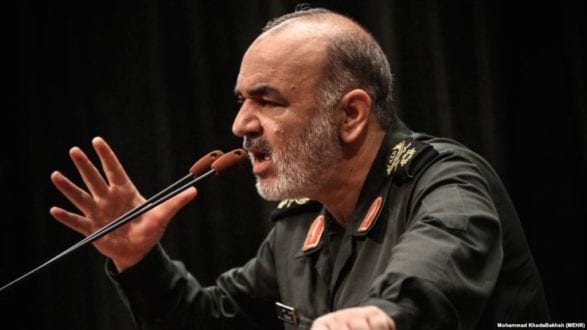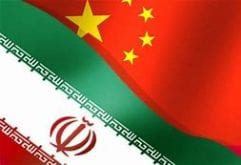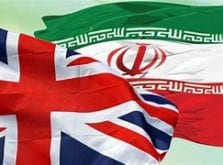foreignpolicy.com – On April 21, Iran’s Islamic Revolutionary Guard Corps (IRGC) got a new leader: Brig. Gen. Hossein Salami, who replaces Maj. Gen. Mohammad Ali Jafari. The change of personnel was unexpected; Jafari’s tenure, which started in 2007, had just been extended by three years in 2017. He will now preside over the Hazrat Baqiatollah al-Azam Cultural and Social Headquarters, an office for countering the so-called Western soft war against Iran. Salami, meanwhile, will take over the IRGC at a time when Iran is facing many external and internal challenges to the stability of the Islamic regime.
Salami is famous for his anti-U.S. bluster. He once said he would welcome a war with the country and famously taunted Washington when the IRGC navy seized U.S. boats in 2016. “The marines,” he said, “were crying when they were being captured.” In 2018, he argued that the only way to confront Iran’s enemies was resistance, not diplomacy. And in February, he called on Iran’s forces to “cleanse the planet from the filth of [America and Israel’s] existence.”
A native of Isfahan, Salami joined the IRGC in the 1980s when he was still a college student for mechanical engineering. He was soon sent to the front lines of the Iran-Iraq War. He quickly rose through the ranks of Isfahan’s 14th Imam Hossein Division and its 25th Karbala Division and was eventually promoted to command both units. After the war ended in 1988, Salami refocused his academic studies on defense management and became the superintendent of the IRGC’s staff college. He then served as the commander of the IRGC air force and as the operations deputy of the IRGC joint staff. For the past 10 years, he has served as the deputy commander of the IRGC.
Salami may have sterling credentials, but his sudden promotion is still surprising. His predecessor, Jafari, was supposed to stay in place until at least early 2020. And although Jafari has been handed a plum position at Hazrat Baqiatollah al-Azam, it is clear that this is a demotion.
He’s likely paying for a couple of mistakes. First, Tehran and the IRGC are facing harsh domestic criticism for their failure to cope with massive flooding in several provinces across Iran. The floods killed dozens of Iranian civilians and potentially cost billions of dollars in property damage, with thousands of villages and towns were affected.
Senior IRGC officers who have traveled to flood-hit areas have been threatened and cursed by angry mobs.
Senior IRGC officers who have traveled to flood-hit areas have been threatened and cursed by angry mobs.
Observers have even recommended that military officials refrain from further visits and have questioned the IRGC’s readiness to handle such crises. Tehran is under so much pressure to do something for the flooded regions that it has deployed IRGC Quds Force commander Qassem Suleimani for a one-month tour of flooded provinces, hoping the popular general can rally public support for the regime and the guards.
Second, over the last year, Iran has been unsuccessfully struggling to counter U.S. President Donald Trump’s “maximum pressure” approach to Iran. The regime’s latest failure was its inability to head off Washington’s designation of the IRGC as a foreign terrorist organization. Given the current U.S. sanctions that already existed against Iran, the designation is mostly symbolic, although it did lead to social media platforms like Instagram banning accounts of IRGC-related personnel (including former and present generals). For their part, Iran’s leaders may think that Salami’s appointment will bring new morale to the IRGC’s fight against West. The IRGC-linked newspaper Jahan, for example, claimed that Salami’s new position marks a new era of a “more clear confrontation” with the United States and Israel.
Finally, the decision to oust Jafari may have political roots. The IRGC is one of the strongest bases of power in Iran. It controls millions of conscripts as well as important parts of the Iranian economy such as construction, infrastructures, and energy. Its commander is a very powerful person, and it is natural to suspect that power struggles inside the IRGC could have contributed to the decision.
For now, it is too early to say how the change at the top of the IRGC will affect Iran’s strategy, especially toward the United States. Yet one thing is clear: Now that Iran’s leaders have shown a readiness to reshuffle the corps’ top ranks, the IRGC will have less appetite for regional adventures and might even be more risk-averse in challenging the United States’ terrorist designation, since organizations under new management tend to take time to stabilize themselves. In other words, a step that was probably meant to increase Iran’s deterrence against Washington will actually force Iran to hold its horses for the short term.
 Shabtabnews In this dark night, I have lost my way – Arise from a corner, oh you the star of guidance.
Shabtabnews In this dark night, I have lost my way – Arise from a corner, oh you the star of guidance.



